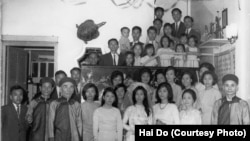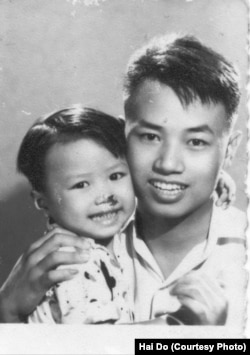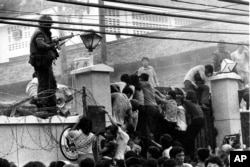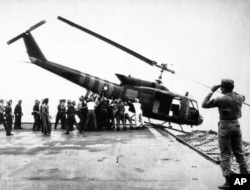Editor’s Note: Hai Do is chief of the English Learning Branch at Voice of America. A short version of this story was originally published in The Philadelphia Inquirer on the 30th anniversary of the end of the Vietnam War.
All I could see were the thousands of hollow eyes looking in despair as the cargo vessel pulled away from its berth along the Saigon River. This moment, so calm and so quiet, was punctured nightly when I woke up, breaking out in a sweat, after seeing that those hollow eyes were my own.
For years after the fall of Saigon on April 30, 1975, the scene played out every night in my sleep as a reminder of how close I had come to being left behind as communist forces entered the city.
I was 17 at the time. The Vietnam War had been raging my entire life, as well as my parents' entire lives. Born and raised in North Vietnam, my parents moved south as the Geneva Convention in 1954 divided the country. The division ended up splitting family members, some who took up arms fighting for communism in the North and others, nationalism in the South.
My father, Hoe, joined the South Vietnamese army and rose to the rank of major in artillery. The only times we ever saw him were at army hospitals, where he was nursing his wounds, or at special family occasions. One time, he arrived at a cousin's wedding in battle fatigues, carrying the smell of gunpowder and the red dirt of Pleiku. Everyone paused as he entered the room.
Life went on in Saigon while my father fought battles in An Loc, Ban Me Thuat and Tay Ninh. My older sister, Thuy; a younger brother, Vu; and I would head off to school six days a week as our mother, Pham Thi Loc, struggled daily to bring home food. She would send us off to school with canteens of white rice and not much else.
The beginning of the months, though, we were treated to portions of meat to go with vegetables and rice, whenever our father could send home part of his salary.
The Tet Offensive
But the war took a turn in 1968.
Vietnamese believe that whatever you do for Tet - the New Year's Day of the lunar calendar - will shape your fortune for the year. My father would come home as both sides of the conflict stopped fighting to observe the holiday. There would be new clothes to wear, more food to eat, and lucky money to spend. We would celebrate with firecrackers to scare off the ghosts of the past and the evils of the future.
On the morning of Tet in 1968, the sound of firecrackers turned out to be the sound of gunfire. Communist forces broke the traditional cease-fire and staged surprise attacks in every community in the South.
Hiding in the alley in front of our house in Phu Nhuan, on the edge of Saigon, communist soldiers attacked Fort Tran Hung Dao, the headquarters of the South Vietnamese armed forces, with batteries of machine guns.
As a fire started to spread in the neighborhood, we had to leave our hiding place, our own home. I was about 11 years old, but I will never forget having to walk through the gauntlet of Communist soldiers to flee the approaching fire.
Holding on to my mother's arm, I looked straight ahead and kept saying to myself, "If I make myself so small, they're not going to see me and they're not going to shoot me."
We walked away from the fighting in Saigon and headed to the countryside, toward my grandfather’s house.
The fighting closed my elementary school for several months but gave me the time to spend with my grandfather, Pham Dinh Lieu. During the day, I would read aloud the news stories from the Vietnamese daily Chinh Luan for my aging grandfather.
I was frustrated to see stories censored by large swaths of black ink and delighted once I understood the news hidden in fables written by columnists. At night, we would listen to the BBC and the Voice of America shortwave broadcasts because the signals were strong and clear. These broadcasts became our lifeline for news and information.
Learning to survive
Every time a siren went off alerting us to a mortar attack, we were told to lie down alongside a wall. Supposedly, if a mortar shell hit the house, only the roof and the top section of a wall would collapse, which would create a pocket that could save your life. I would pick up a book - any book - lie down along a wall and go into my own world.
The sound of gunfire was becoming routine. I even slept through an overnight attack from Communist forces while visiting relatives in Bien Hoa.
The reality of war came one day at sunrise when I saw a woman wailing under her straw hat by a pile of rubble. The woman had come home from an overnight shift to find her house collapsed by mortar shells, which buried her entire family in their sleep.
A few years later, on my way to school, I said hello as usual to the uniform cleaner by the railroad tracks, waved to the owner of the motorcycle repair shop, and passed the old man who slept on the sidewalk in front of the cinema on Vo Di Nguy Street.
As I continued on my way, a bomb detonated, sending the theater's facade crashing onto the sidewalk. When I ran back to look, there was a pile of concrete on the sidewalk. Somewhere underneath was the old man I had seen only moments earlier.
Later, I received a stern lecture from my father to avoid doing so again, because terrorists would routinely set off a second explosive device to inflict more damage as crowds gathered.
In 1975, I was preparing for the baccalaureate exam, which could determine my whole future and was to be taken in summer. A failing grade meant straight to basic training for the armed forces, while a passing one would open the door to state universities for further education.
Three years earlier, my cousin Linh was drafted into the South Vietnamese Army after failing the exam. The army trained him for about three months and sent him, as a newly commissioned second lieutenant, to lead a patrol unit in the central region. My aunt Sam said that Linh would call her late at night to say how scared he was of the dark. Then she received a call from the army, asking her to pick up his body at the morgue. A sniper’s bullet had pierced his eye.
The spring of 1975
By the spring of 1975, the North Vietnamese army was advancing at a breakneck pace.
As communist forces closed in on Saigon, planeloads of well-connected Vietnamese took off hourly from the Tan Son Nhat air base near our home.
South Vietnam President Nguyen Van Thieu broadcast his farewell address, blaming the Americans for losses, before fleeing, first to Taiwan and eventually settling in the United States. General Nguyen Cao Ky, an air force general and South Vietnam leader, crisscrossed Saigon calling for troops to defend the motherland, and then fled the country, too, eventually settling in the United States.
On the morning of April 29, my family was awakened by loud explosions as shells landed at the air base.
My family fled our home: my dad holding my 2-year-old sister Diem in one arm and one of my three brothers in the other; my mom clutching my other two brothers, and my sister Thuy and I helping our 72-year-old grandmother.
With every burst of gunfire, my father hollered at us to pick up the pace, while my grandmother mumbled about how fruitless it was to bother running.
I could see rows of helicopters flying overhead, the wind created by the rotor blades shaking everything in sight.
But I was not prepared for what I saw in downtown Saigon. There were men with eyes bulging and weapons waving, women sobbing and children crying for anyone to latch on to.
A sea of people was pushing, shoving, punching and screaming toward the U.S. Embassy, at least five blocks away. For the first time in my life, I was terrified. I snatched glances from the corner of my eyes, afraid that the men would empty their weapons if I dared to look them in the eyes.
My father changed our course to Bach Dang naval base on the other side of the city, hoping we could get on board a naval vessel. The crowd in front of the base was small enough to afford a view of the gate, but bursts of gunfire over our heads sent people cowering to the pavement. We realized our own soldiers were firing at us as they fled, too!
Our last hope was fading as we started heading south, ahead of the communist forces marching into Saigon. Low-flying jets taking aim at targets around the city drowned out the noise of the helicopter blades. Then, the loudest explosion imaginable shook the earth below my feet.
An orange ball of fire shot up in the sky ahead, followed by another. The oil reserve tanks in Nha Be exploded, sending up columns of fire and smoke.
Fleeing Vietnam on a cargo vessel
But right in front of us, a black cargo vessel was boarding.
A single man with arms outstretched on the ramp was pushing against a tidal wave of people desperate to board. With my dad in front, we pushed and pulled and shoved and clutched one another until all of us were aboard. Forcing our way to the hold of the cargo vessel, and joined the exodus of boat people fleeing Vietnam.
The Tien Phong was a 60-foot vessel designed to navigate the Mekong River. But as the tide turned in South Vietnam, its owner and a group of paying passengers organized the vessel's maiden voyage on the high seas to escape. They were not prepared for the number of refugees who forced their way aboard.
The first two days on board without food or water, I still had enough energy to roam about and found two bags of flour tucked away in a corner. With a tin can attached to a string, I fetched seawater and mixed it together with the flour. How hard could it be to make some bread? I persuaded the boat owner to bake it in the oven. The result was a clump of white powder burnt on the outside. I didn't even get through the first bite.
A lasting image is of my father walking around the boat with the limp body of my sister Diem. She was dehydrated after two days at sea. He begged until someone gave her some water and food. My father dipped his finger in the cup of water, and put it in her mouth. He repeated it over and over and then shared what was left with our family. Then, he would pick Diem up again and go to a different family to beg some more.
Overcome by hunger, I faded into my corner of the world, a doorframe leading to the deck below, where fellow refugees had claimed every step. The boat was so crowded no one had room to lie down.
After seven days, the Tien Phong ran across American warships that were stationed off the coast of South Vietnam to rescue refugees escaping by boat - or anything that floated.
I was barely conscious when my father and an American sailor propped my head up to pour some liquid into my mouth. It tasted like milk. I hated milk. I still hate it. But I proceeded to drink the whole container and asked for more. It revived me.
The warships escorted our vessel to the Philippines. Nine days after we set sail, we arrived at Subic Bay after midnight with only the twinkle of lights visible in the harbor.
With his arm around me, my father talked about our lives, our hopes and our future. Then, he pulled out a pistol that he had carried on the battlefields, on the run, and on the boat, and dropped it into the sea.







